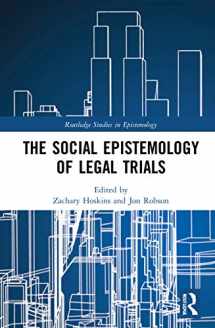
The Social Epistemology of Legal Trials (Routledge Studies in Epistemology)
Book details
Summary
Description
"This collection is the first book-length examination of the various epistemological issues underlying legal trials. Trials are, among other things, centrally concerned with determining truth: whether a criminal defendant has in fact culpably committed the act of which they are accused, or whether a civil defendant is in fact responsible for the damages alleged by the plaintiff. But are trials truth-conducive? Assessing the value of trials as truth-seeking endeavors requires that we consider a host of underlying social epistemological questions. The contributors to this volume address a number of these pressing questions, including but not limited to the following: How much credence should they give to eyewitness testimony? How should we balance the relative epistemic value of testimony offered by defense witnesses and prosecution (or plaintiff) witnesses? Are juries an effective means of arriving at justified beliefs about a defendant's guilt or innocence? When, if ever, is statistical information about a defendant's character relevant? What degree of certainty should we require to support a verdict of 'guilty'? How should standards of proof be interpreted for allegations that contain numerous discrete components? The Social Epistemology of Legal Trials will be of interest to scholars and upper-level students working on issues at the intersection of epistemology and philosophy of law"--


We would LOVE it if you could help us and other readers by reviewing the book
Book review



